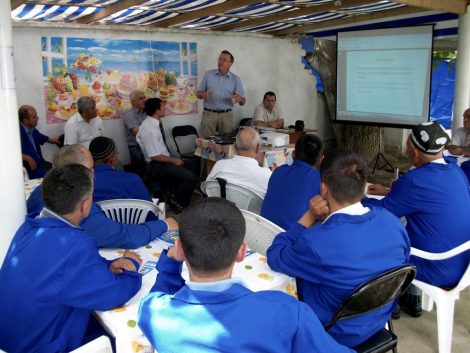Veterinary Legislation Support
As an essential element of a nation’s infrastructure, veterinary legislation provides the powers necessary for Veterinary Authorities to ensure animal and public health. The Veterinary Legislation Support Programme (VLSP) aims to identify gaps and weaknesses in national veterinary legislation, and to assist Members in revising or developing new legislation.

The importance of strong national veterinary legislation
Appropriate national veterinary legislation is essential to support the work of Veterinary Services. It is a key factor in addressing global challenges, such as the growing demand for food of animal origin, the spread of diseases across borders, the rise of antimicrobial resistance and the increased risk of bioterrorism. It can, for instance, ensure that countries take a strong stance against the use of falsified medicines or that imported animals and animal products are strictly controlled. However, gaps in national legislations may affect the ability of Veterinary Services to fulfill their mission.
WOAH international standards on animal health and welfare are designed as guidelines to serve as the basis for national regulatory frameworks. They need to be translated into national legislation in order to be successfully implemented on the ground and to achieve their purpose.
Supporting WOAH Members in strengthening their national legislation
The Veterinary Legislation Support Programme (VLSP) helps Members address their needs for clear, comprehensive legislation. A dedicated team of experts reviews and analyses the national veterinary legislation to identify gaps and weaknesses, and supports the country in strengthening their legislation as well as their capacity to draft quality legislation. The VLSP can consist of two stages:
- Stage 1: Veterinary Legislation Identification Mission
- Stage 2: Veterinary Legislation Agreement
Stage 1: Veterinary Legislation Identification Mission
This mission aims to assess the conformity of a Member’s veterinary legislation with the dedicated WOAH international standards on veterinary legislation (Chapter 3.4. of the Terrestrial Code) and provide recommendations for its modernisation.
Led by a team of experts, consisting of at least one veterinarian and one lawyer, the mission can be organised either in-country over several days or remotely through a series of videoconferences over a period of two to three months.
Based on the recommendations made in the Identification Mission report, a Member may choose to pursue legislative reform by amending existing legislation or by drafting new legislation.
Members may do this on their own or they may request further assistance from WOAH in the form of a Veterinary Legislation Agreement.
Veterinary Legislation Identification Missions may also cover specific topics at the request of the national Delegate:
- Biological threat reduction. Such missions review relevant, existing legislation to help ensure that the capacity of Veterinary Services to respond to an intentional introduction of biological agents is fit for purpose, and that the need for cooperation with other competent authorities is recognised and addressed through collaborative arrangements that are in place before incidents occur.
More information available in the brochure below:
- Antimicrobial resistance. Legislation is an essential component of effective governance to address this growing global concern. However, relevant legislation spans multiple sectors (human health, food safety, animal health and production, pesticides, plant health and the environment) and regulatory responses have often been developed without sufficient consideration of the potential implications among these sectors. To support national processes of legislative reform, a One Health Legislative Assessment Tool for Antimicrobial Resistance is available.
Stage 2: Veterinary Legislation Agreement
This one-year, renewable Agreement can be initiated after a six-month preparatory phase. It supports the revision of existing legislation and/or the development of specific laws and regulations, based on the recommendations made at Stage 1 and according to national priorities and strategic objectives.
All Stage 2 reports are confidential
View the state of play of the Veterinary Legislation Support Programme
How can WOAH Members get Veterinary Legislation Support?
Stage 1: Veterinary Legislation Identification Mission
Any Member that has completed a PVS Evaluation mission can make a request through the national Delegate.
The mission must be properly prepared by the Member who must complete a questionnaire and provide the team of experts with key veterinary legislation in advance.
Stage 2: Veterinary Legislation Agreement
Any Member that has completed a Veterinary Legislation Identification Mission can make a request through the national Delegate.
WOAH reserves the right to engage or not engage in such a request, based in particular on the assessment by the Identification Mission Team of the Member’s capacity to undertake future legislative work.
